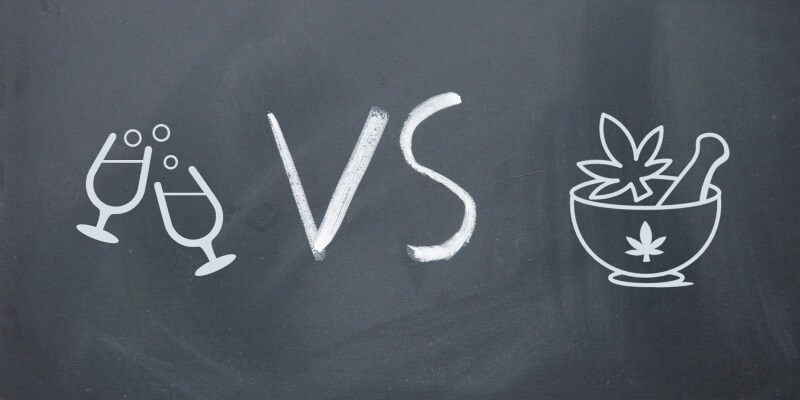Marijuana vs. Alcohol - Controversial Topics for Speech and Debate

Contents:
Introduction:
The marijuana vs. alcohol debate is one of many controversial topics for speech and debate.
The controversy over the dangers of marijuana compared to alcohol is a contentious subject that spans different demographics, cultures, and legislatures worldwide. It is a debate influenced by a complex intersection of medical research, societal norms, public policy, and individual beliefs.
Understanding the Issue:
The Dangers of Alcohol:
Alcohol is a legally accepted substance across the globe. Its impacts are widely known, with the World Health Organization citing over three million annual deaths globally related to harmful alcohol use. Issues associated with alcohol misuse include liver cirrhosis, cardiovascular diseases, various cancers, and alcohol use disorders.
The Dangers of Marijuana:
Marijuana's reputation is quite different. Despite the increasing trend toward legalization in many parts of the world, the potential risks linked to marijuana use remain contentious. The documented risks include cognitive impairment, mental health disorders, and potential addiction. However, these dangers are often contrasted with the therapeutic benefits of marijuana for certain medical conditions.
The Controversy:
The argument arises due to the seeming disparity between the societal acceptance of alcohol and the stigmatization and criminalization of marijuana. Advocates of marijuana legalization argue that its associated dangers are comparatively less severe than alcohol. Conversely, critics assert that the long-term effects of marijuana are not sufficiently researched, and therefore, its complete legalization could lead to unforeseen consequences.
Controversial Topics for Speech Samples
An impromptu speech is an unplanned or unscripted speech, given without any prior preparation or rehearsal. It's often delivered in response to a sudden situation or an unexpected question, and sometimes controversial topics for speech. The speaker must think quickly, organize their thoughts on the spot, and present their ideas coherently and persuasively. It's a skill often used in public speaking, debates, meetings, and daily conversations. The following is an example of an impromptu speech on the Alcohol versus Marijuana topic.

Example Impromptu Speech: Alcohol vs. Marijuana
Introduction:
"We find ourselves at a crossroads in societal norms and public policy, caught in a debate between two substances: alcohol, a widely accepted yet potentially deadly intoxicant, and marijuana, a substance often stigmatized yet increasingly recognized for its therapeutic benefits. Today, I aim to shed light on the controversy over the dangers of these substances and why this debate is so significant for our society."
Analysis: A good introduction presents the topic clearly and sparks interest. Here, the speaker introduces the topic and briefly glimpses its importance.
Main Point 1:
"Let's begin with alcohol. It's been deeply ingrained in many cultures, forming an essential part of social rituals and gatherings. Yet, its potential for misuse and subsequent harm is well-documented, causing significant health issues and societal costs."
Analysis: The first main point dives into the complexities of alcohol, its societal acceptance, and potential dangers.
Main Point 2:
"On the other hand, we have marijuana, whose dangers, while existent, are a subject of much debate. Some studies suggest its potential harms are less severe than alcohol, while others warn against understudied long-term effects. Furthermore, it's impossible to ignore the growing body of research emphasizing its medicinal benefits."
Analysis: The second main point introduces the complex issue of marijuana, presenting its potential harms and benefits.
Main Point 3:
"This brings us to the crux of the controversy: why is one substance legally and socially accepted while the other is stigmatized and often criminalized? Is it due to a well-founded understanding of the associated risks, or is it more related to cultural biases and historical trends?"
Analysis: The third main point addresses the controversy directly, questioning the disparity in societal views.
Conclusion:
"The marijuana versus alcohol debate calls for a nuanced understanding. It prompts us to rethink societal norms and challenges our legal and healthcare systems to evolve based on evidence-based practices rather than ingrained biases. Only then, can we truly ensure public safety and health."
Analysis: The conclusion effectively sums up the main points and reinforces the importance of the topic.
Crafting an impromptu speech like this requires understanding the subject matter, organizing thoughts, and clearly presenting complex ideas.
An extemporaneous speech is a type of speech that is crafted and practiced during a given preparation period but not memorized word-for-word. The controversial topics for speech drawn by the speaker demands an answer, which is typically previewed in the introduction and repeated in the conclusion. An extemp speech is designed to sound natural and spontaneous while being well-organized and precise.The following is an example of an extemporaneous speech on the Alcohol versus Marijuana topic.

Example Extemporaneous Speech: Alcohol vs. Marijuana
We stand at a societal crossroads, locked in a contentious debate between two substances: alcohol, a globally accepted yet potentially dangerous intoxicant, and marijuana, a plant often stigmatized yet increasingly acknowledged for its therapeutic properties. Today, I will delve into the controversy over the dangers of marijuana compared to alcohol and illuminate why this discussion holds profound significance for our society and its future.
Alcohol, an ancient brew steeped in tradition, forms an integral part of our social fabric. Be it a toast to celebrate joyous occasions, a casual meet-up with friends, or a nightcap to soothe the nerves, alcohol has its place. Yet, its harmful impacts are significant and cannot be ignored. The World Health Organization reports that the harmful use of alcohol results in 3.3 million deaths annually worldwide. Its misuse often leads to various health problems, such as liver cirrhosis, cardiovascular diseases, cancers, and debilitating alcohol use disorders. These stark statistics reveal the grim side of a substance interwoven into our lives.
Contrastingly, marijuana has long been under the shadow of stigmatization and criminalization. But this is changing. Over recent years, many jurisdictions have moved toward decriminalization or legalization, fueled by growing recognition of marijuana's potential therapeutic benefits. Indeed, research has highlighted its usefulness in managing chronic pain, mitigating the harsh effects of chemotherapy, and even controlling epileptic seizures. But marijuana is not without its risks. Studies indicate potential cognitive impairment, an increased likelihood of mental health disorders, and possible addiction. The caveat, however, is that the severity and prevalence of these effects are still being debated within the scientific community.
This divergence between societal acceptance of alcohol and the demonization of marijuana forms the crux of our debate. The alcohol industry is an economic powerhouse; its products are freely sold and advertised. On the other hand, marijuana, with arguably fewer societal costs and additional therapeutic benefits, remains a contentious issue, with many facing severe legal penalties for its use. Does this disparity arise from a nuanced understanding of the associated risks, or is it the result of deeply ingrained cultural biases and historical trends?
A 2015 Scientific Reports study sought to quantify various substances' comparative risks. The study concluded that alcohol was 114 times more harmful than marijuana to the user. Despite this and many similar studies, we still grapple with inconsistent laws and societal norms regarding these two substances.
In conclusion, the debate surrounding marijuana versus alcohol is more than a discussion about two substances. It's a reflection of our societal norms, a challenge to our ingrained biases, and a question of how our legal and healthcare systems adapt to new evidence and changing perceptions. As we navigate this complex issue, it's crucial to let scientific evidence guide our decisions rather than historical prejudices. Only then can we foster an environment prioritizing public health and safety.
Thank you.
- Home
- Controversial
- Controversial Topics for Speech



